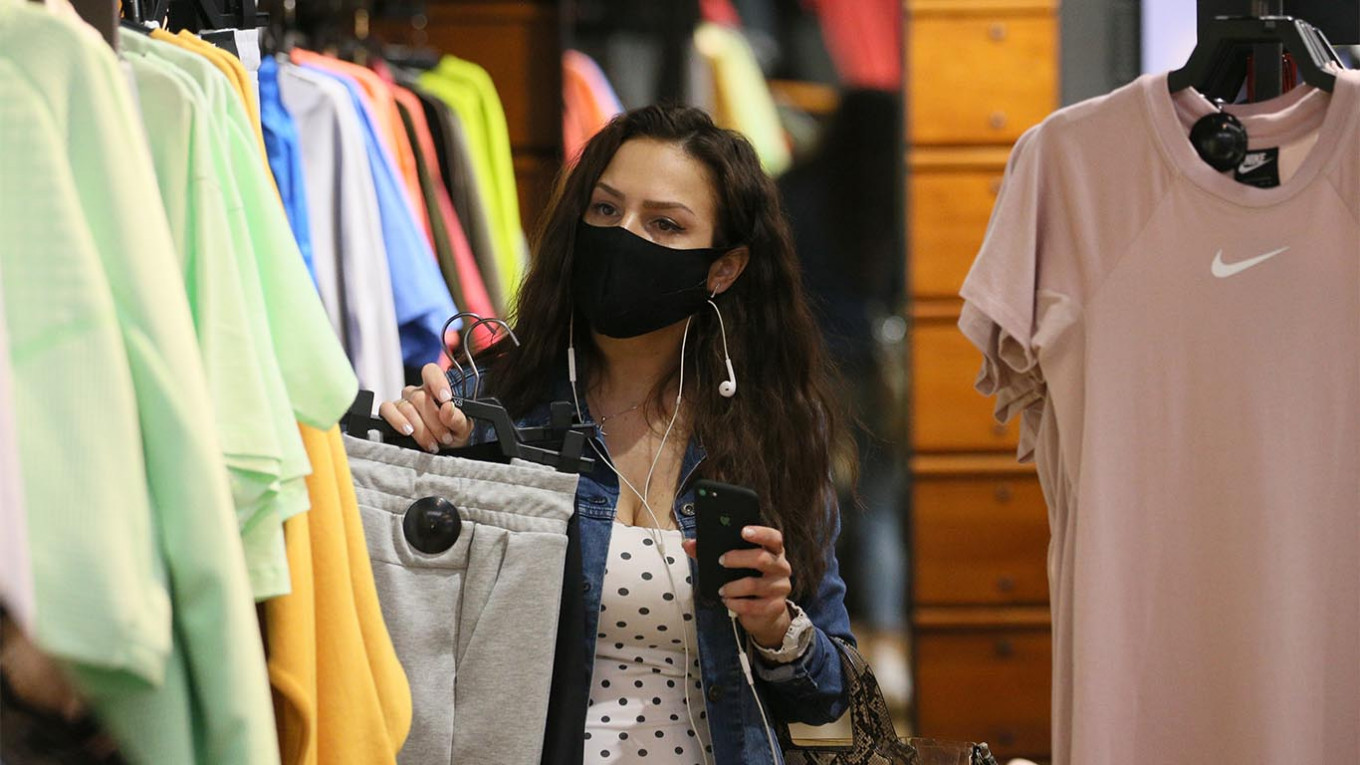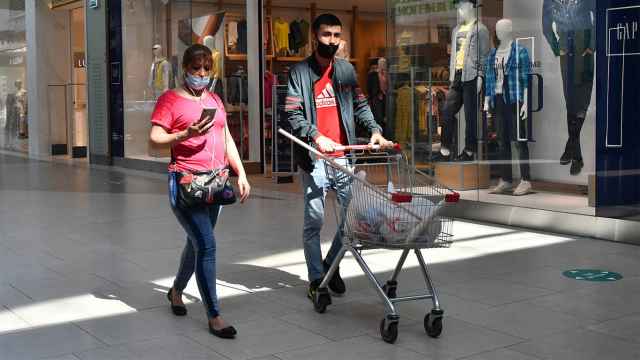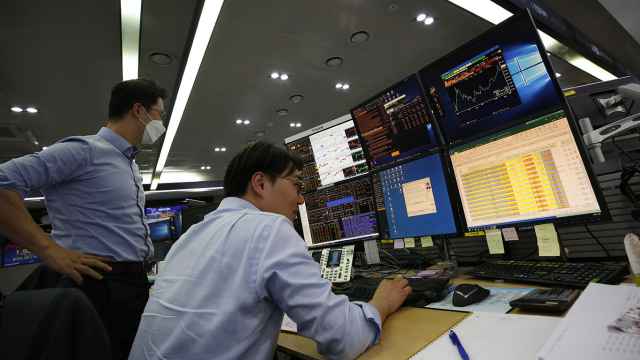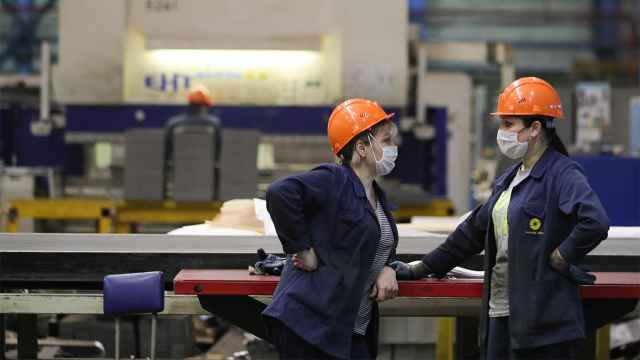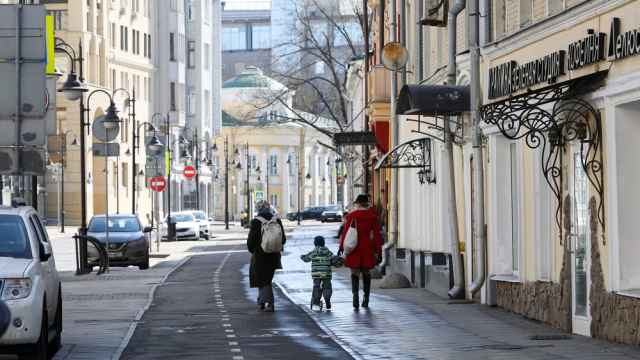Last week Oleg Voronin opened the doors of his four I AM Studio upmarket women’s boutiques in Moscow for the first time in two months.
After a few days spent buying masks, gloves and disinfectants, rejigging the layout of the central Moscow showroom and sending staff for training sessions on new health and safety rules, chief executive Voronin was back in business on June 1 — the first day the authorities allowed some retail outlets to reopen following the coronavirus lockdown.
But would-be customers weren’t banging down the doors to get inside.
“The first week showed that there is no rush or demand frenzy,” Voronin told The Moscow Times. “Customers are coming, but, depending on the store, traffic has fallen by two to four times. In one shop, there are very few visitors.”
The reopening of shops was one of the first steps in relaxing the strict quarantine measures which Moscow — now with almost 200,000 confirmed coronavirus infections — put in place to contain the spread of the pandemic back in March.
But the fear of catching the virus combined with the prospect of a prolonged economic crisis, job losses and lower salaries, have caused many shoppers to stay home. Retailers don’t expect their business to return to pre-crisis levels until at least 2021, while a significant number of consumers say they plan to permanently cut back their spending as a result of the pandemic.
“We estimate the drop in traffic in our stores will be 50%,” said Dmitry Shirokov, general director of porcelain seller Dom Farfora, which has five stores in Moscow.
“We hope the customer flow will recover and the number of customers will increase … Our forecast for recovery is within a year. Provided there are no negative events in the near future,” he added.
Swedish furniture giant Ikea has said it could take 18 months for its sales and revenue in Russia to return to pre-coronavirus levels. Social distancing rules requiring shops to ensure customers can keep sufficient space between them as they walk around mean maximum capacity at its giant stores is down by 50-60%, a representative told The Moscow Times.
Despite shops being allowed to reopen, Muscovites are still largely required to stay at home. Payments data from VTB Bank shows sales in Moscow’s malls were running at just a third of their usual levels in the first week of lighter quarantine restrictions.
Some owners hope that once more mobility restrictions are lifted business will bounce back stronger. But consumer surveys — and already weak compliance with stay-at-home rules — suggest there is unlikely to be a burst of activity and unleashing of pent-up demand even when that does happen.
A recent survey by the Boston Consulting Group and Russian research group Romir of Russians’ plans for spending after lockdown painted a somber picture. One in six said their outgoings would never reach pre-crisis levels, while half said they would get there, but only after several months or a year.
In Moscow, 50% of respondents said they would spend less in shopping centers in future, with the main reason being a desire to stay away from busy public places. That trend has also played out in other sectors, with travel agents reporting higher demand for escapes to nature, and Russians telling pollsters they plan to spend more of their spare time — and money — getting out of the city, playing sports and cooking at home, rather than shopping, going to restaurants or travelling abroad.
Living standards squeezed
While virus fears play a part in these decisions, another factor is economic. Russia’s official unemployment rate has started to rise rapidly, bank data shows average wages of those in work were down by up to 10% in April — a figure which doesn’t include cuts to so-called “envelope salaries,” where smaller firms pay part or entire salaries in cash — and disposable incomes are predicted to fall by up to 12% this year, the Higher School of Economics predicts.
Amid such a poor outlook for household finances, it will be difficult for the recent surge in online shopping in Russia to compensate for a months-long decline at physical stores.
Ikea says orders online should double — to around 20% of its total, and supermarkets have also seen online orders jump exponentially, rolling out new delivery networks and dark stores — shops which are closed to the public and used as fulfilment bases for online orders — to meet demand. But the surge comes from a low base, as e-commerce accounted for just 5% of Russian retail before the crisis. Moreover, Data Insight, a firm which analyzes Russia’s online sellers, found sales are already back down to pre-crisis levels.
Aside from the slow exit from coronavirus hibernation, retailers have also had to deal with a host of other issues as they try to lift the shutters.
“In Moscow, all staff must have fresh Covid-19 and antibody tests. It’s possible to pay clinics to test a large number of employees, but all the appointments are booked in advance, and results take several days to arrive,” said Oleg Pai, founder of Mixit, a cosmetics manufacturer and retailer, who has not yet been able to reopen Moscow stores.
In stores outside the capital which have already reopened, customers are sending less when they do come and are hungry for discounts and promotions. A ban on testers for foundations, mascaras and creams, adds another challenge to boosting sales, Pai said.

Rent disputes, which have been a major sticking point for smaller businesses throughout the crisis, also remain an issue. While many landlords offered discounts during Russia’s non-working period, and others have dynamic rates based on revenue, Voronin said that some malls, also starved of income, immediately hiked rates back to pre-crisis levels on June 1. He believes that move is premature and counterproductive at a time when sales are significantly down.
“Funds, to put it mildly, are scarce … there is a big risk that landlords will strangle their tenants with such measures. For us, if the recovery is slow and rent is not reduced, I can’t rule out being forced to relocate to somewhere with more lenient conditions,” he said.
Familiar complaints about insufficient government support continue to rumble on. The government’s flagship “economic recovery plan” currently being worked on has a heavy-sounding five trillion ruble price tag ($72 billion) — but there is little in the way of additional support for small businesses, and economists at Sberbank and VTB pointed to double-counting and a repackaging of already-announced measures.
“The burden on us has increased, and the so-called support measures are clearly insufficient,” said Voronin, whose firm does not qualify for emergency government-backed salary support loans which offer cheap credit of up to 12,130 rubles ($178) per employee per month. The loans can then be written off if businesses keep 90% of their workforce employed.
“To be honest, they wouldn't help us much. Even if we could get them, they would cover about one-seventh of the average employee’s salary … It’s difficult to call it serious support. It’s more of a box-ticking gesture.”
Business owners are also aware that their fortunes are partly out of their control. Moscow authorities are flirting with easing restrictions as the rate of new infections declines — a move which could boost footfall — but with 2,000 new Covid-19 cases a day still being registered in the capital, some fear a second wave could trigger a second slump in business. Outside Moscow, the number of new infections in Russia is still increasing — passing 7,000 on Sunday for the first time since the outbreak of the pandemic.
Even as shops begin to reopen, predicting how they will fare, is still a tricky task, Voronin says.
“You need to live for today and respond quickly. It doesn’t make sense to think more than a year ahead. In the current situation, it’s more reasonable to focus on the next one to three months — and make weekly adjustments.”
A Message from The Moscow Times:
Dear readers,
We are facing unprecedented challenges. Russia's Prosecutor General's Office has designated The Moscow Times as an "undesirable" organization, criminalizing our work and putting our staff at risk of prosecution. This follows our earlier unjust labeling as a "foreign agent."
These actions are direct attempts to silence independent journalism in Russia. The authorities claim our work "discredits the decisions of the Russian leadership." We see things differently: we strive to provide accurate, unbiased reporting on Russia.
We, the journalists of The Moscow Times, refuse to be silenced. But to continue our work, we need your help.
Your support, no matter how small, makes a world of difference. If you can, please support us monthly starting from just $2. It's quick to set up, and every contribution makes a significant impact.
By supporting The Moscow Times, you're defending open, independent journalism in the face of repression. Thank you for standing with us.
Remind me later.



